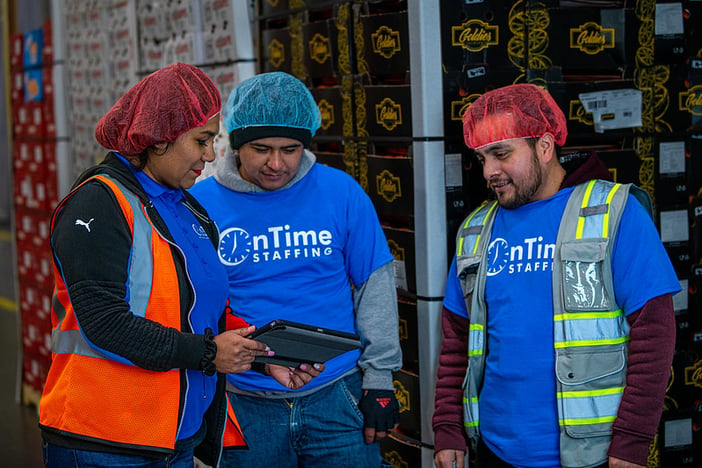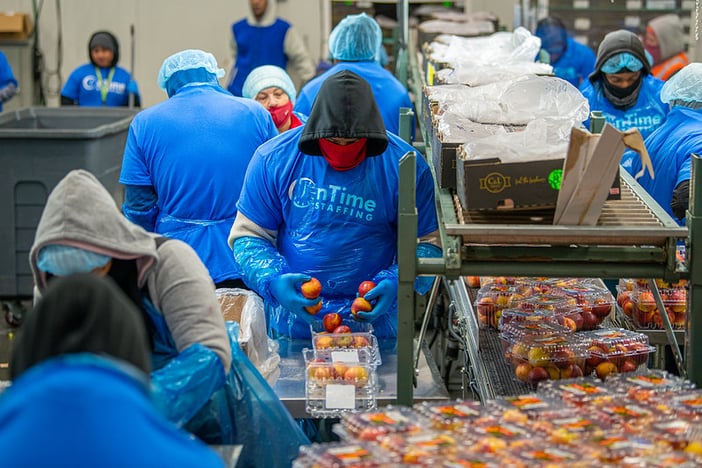Navigating Quality Control in Food Manufacturing Warehouses
In the high-stakes game of food manufacturing, quality control is the silent hero, ensuring food safety and delicious consistency at every step. It involves a variety of practices, including inspection, testing, and documentation, to ensure compliance with regulatory requirements and industry standards. However, food manufacturers face various challenges in maintaining high-quality standards, such as changing consumer demands, complex regulations, environmental factors, and human errors. These challenges highlight the need for a proactive approach to quality control in food manufacturing, including regular testing, inspections, and using tools and technologies to automate or assist quality control tasks.
Learn how to implement robust inspections, leverage technology, and empower your team, ensuring consistent quality and a reputation for excellence.
Understanding the Challenges in Quality Control in Food Manufacturing
As a warehouse manager in a food manufacturing plant, you will likely face the following significant challenges that can impact the quality and safety of food products.
Regulatory Compliance
Complying with the complex web of food safety standards is like walking a tightrope stretched over a chasm of legal repercussions. You must comply with the FDA's intricate regulations, the USDA's specific guidelines, and the HACCP system's risk-based approach.
Staying abreast of updates and implementing them effectively is a constant challenge. Yet, the consequences of non-compliance can lead to hefty fines, product recalls, and reputational damage. Some of the most common challenges when trying to stay regulatory compliant include:
- Keeping track of amendments, interpretations, and regional variations can be overwhelming
- Applying broad regulations to specific warehouse operations requires expertise and a nuanced understanding
- Ensuring all personnel understand and adhere to food safety practices necessitates ongoing training and monitoring
Maintaining Product Integrity
Food safety is about safeguarding every step of the journey from farm to fork. This means you have to be vigilant against contamination (physical, chemical, or biological) and spoilage. Some possible challenges when maintaining product integrity include:
- From pests and allergens to improper handling and cleaning, vulnerabilities lurk around every corner
- Maintaining optimal storage conditions for all products, considering varying shelf lives and sensitivities, is a logistical puzzle
- Early detection of compromised products minimizes losses and prevents potential health risks
Inventory and Storage
You have the responsibility of ensuring the harmony of the products through meticulous inventory management and controlled storage conditions. The task comes with the following challenges:
- Balancing efficient storage with FIFO (First-In-First-Out) practices to ensure products are used before expiration is a constant juggling act
- Ensuring consistent temperatures for each product category is crucial to preserving quality and safety
- Tracking expiration dates and stock levels is essential to prevent stockouts and expired products from reaching consumers
Labeling and Packaging
Labeling and packaging may seem simple, but information errors or packaging failures have serious consequences. For instance, it may lead to allergic reactions, misleading consumers, and even legal proceedings. Likely challenges in this case include:
- Nutritional information, allergen warnings, and best-before dates need to be accurate, compliant, and readily understandable
- Leaks, tears, or inadequate seals can compromise product integrity and safety
- Maintaining accuracy and quality standards becomes even more intricate with diverse packaging types and sizes
Best Practices for Effective Quality Control in Food Manufacturing
Despite these treacherous challenges in ensuring food manufacturing control, there's still a lot you can do to succeed. Here are some best practices that can help you transform your warehouse into a fortress of quality:
Implementing Robust Inspection
Think of inspections as your quality control army, patrolling every step of the product journey. Implement robust inspection processes at every stage:
- Inspect incoming ingredients for damage, contamination, and compliance with specifications
- Regularly check storage conditions (temperature, humidity) and product integrity
- Conduct in-line inspections to monitor processes and identify deviations
- Verify accuracy and ensure compliance with regulations
- Inspect final products for damage and proper labeling before dispatch
Inspection frequency and intensity should be risk-based, with greater scrutiny for high-risk products or processes.
Utilizing Technology for Enhanced Monitoring and Traceability
Beyond the basics of warehouse management, a new wave of technology offers potent tools to supercharge your quality control.
- RFID tags to track individual products throughout the warehouse, facilitating real-time location and condition monitoring
- IoT sensors monitor temperature, humidity, and other critical parameters in storage areas, triggering alerts for deviations
- Data analytics to identify trends, predict potential issues, and optimize quality control processes
While these tools don't replace human oversight, they amplify your team's effectiveness and provide invaluable insights.
Investing in Employee Training and Engagement
Comprehensive training of your supply chain staff equips them to identify potential contamination risks and spoilage signs. They are also able to understand and adhere to all quality control procedures, properly use inspection tools and technology, and report any concerns or deviations promptly.
Collaborating With Suppliers for Quality Assurance
Your quality journey doesn't end at your warehouse door. You need to collaborate with suppliers to establish clear quality expectations and specifications. Collaborating with suppliers opens regular communication channels for sharing concerns and best practices. It also opens doors for joint audits and inspections to ensure adherence to standards.
Regular Maintenance and Calibration of Equipment
You need to regularly maintain and calibrate your measurement tools to ensure accuracy. Establish a schedule for calibrating thermometers, scales, and other equipment as per manufacturer recommendations. This also ensures consistent and reliable data, preventing errors that could compromise quality control in food manufacturing.
Case Studies and Success Stories
Example 1: On Time Staffing Streamlines Recruitment and Boosts Retention for National Food Manufacturer
A growing cold food manufacturer needed reliable staffing across three geographically diverse plants, including a new startup in New England. Local agencies weren't meeting their standards, leading to inconsistent workforce quality and high turnover.
On Time Staffing, already a trusted partner at one plant expanded to manage staffing across all three locations. They implemented a comprehensive solution leveraging technology and human expertise:
- Targeted recruitment: Customized sourcing strategies attracted qualified candidates.
- Onsite support: Dedicated staff ensured smooth shift starts and check-ins.
- Enhanced onboarding: Streamlined training facilitated faster integration.
- Engaging programs: Initiatives like new hire touchpoints, surveys, and counseling boosted retention.
- No-show coverage: Spot-filling vacancies minimized absenteeism.
On Time Staffing's technology-driven approach combined with dedicated onsite support provided a scalable solution for the manufacturer's nationwide staffing needs, resulting in a stable, engaged workforce and improved operational efficiency.
Example 2: Successful Implementation of RFID Technology for Real-Time Inventory Monitoring and Traceability by Walmart
In 2022, Walmart embarked on a groundbreaking initiative, mandating suppliers in certain departments equip pallets with RFID tags. This colossal undertaking, the largest RFID deployment in history, aimed to revolutionize inventory management. The results were also impressive:
- Inventory accuracy soared: Real-time tracking eliminated manual counts, minimizing discrepancies by up to 98%.
- Out-of-stocks plummeted: With precise stock visibility, restocking became proactive, reducing out-of-stocks by 30%.
- Checkout lines zipped: Faster product identification at checkout lanes sped up customer transactions.
Example 3: Strategies Implemented by Tyson Foods to Enhance Employee Training and Involvement in Quality Control Processes
Recognizing the crucial role of their frontline workers in upholding quality standards, Tyson Foods launched the Upward Pathways program in 2021. This initiative aimed to enhance employee training and involvement in quality control processes by providing free job skills training, industry-recognized certifications, and standardized promotional pathways.
By empowering its workforce, Tyson Foods achieved significant results:
- Improved skills led to more consistent quality and fewer production errors, minimizing waste.
- A more skilled workforce contributed to smoother operations and higher productivity.
- The opportunity for growth and recognition boosted employee morale and commitment.
Example 4: Aer-Flo Overcomes Staffing Hurdles With On Time Staffing's Tech-Driven Approach
Aer-Flo was having problems filling skilled positions like sewing machine operators and material cutters while struggling with high turnover.
On Time Staffing deployed an onsite manager, implemented targeted recruitment strategies, and provided standardized assessments. They also boosted engagement through an attendance incentive program.
Aer-Flo achieved a fully staffed workforce, streamlined recruiting, and gained a proactive partner in On Time Staffing.
Emerging Trends and Innovations
The landscape of quality control in food manufacturing is undergoing a transformative shift, driven by innovative technologies like AI, blockchain, and sustainable practices. Here are some of the emerging trends in the industry:
Adoption of Artificial Intelligence and Machine Learning for Predictive Quality Control in Food Manufacturing
Companies are leveraging AI to predict and prevent quality issues and using machine learning to empower robots for faster, more accurate inspections. This saves time and resources for higher-level tasks. These advancements also transform quality control in food manufacturing, offering proactive warehouse solutions and freeing up human expertise for more complex work.
Integration of Blockchain Technology for Enhanced Transparency and Trust in Supply Chain Management
Blockchain creates transparent records of a product's journey throughout the supply chain, accessible to everyone from food manufacturing staff to consumers. This enhanced transparency allows everyone to track origin, quality certifications, and even the environmental impact of a product, building trust and collaboration across the chain.
Exploring Sustainable Practices for Both Quality Control and Environmental Conservation
Sustainable practices are a win-win: using eco-friendly materials reduces environmental impact without sacrificing quality, appealing to eco-conscious consumers. Plus, AI and sensors optimize resource use, minimizing waste and boosting efficiency, leading to both environmental and financial benefits.
Conclusion
Maintaining high-quality standards in food manufacturing requires a vigilant and proactive approach. Challenges like regulations, product integrity, and labeling demand robust inspections, technology integration, and high-quality light industrial staff recruitment and engagement. By implementing best practices like these, warehouse managers can navigate the quality control maze with confidence.
Collaborating with suppliers, maintaining equipment, and embracing emerging trends like AI and blockchain further strengthen your position. On Time Staffing can provide support to warehouse managers by offering on-site warehouse employee management solutions to address these challenges and ensure optimal quality control in food manufacturing plants. Feel free to contact us for more information.



